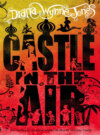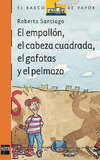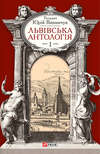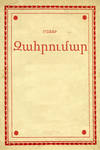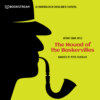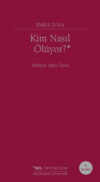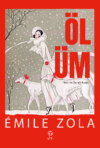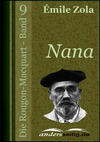Kitabı oku: «The Three Cities Trilogy: Paris, Complete», sayfa 26
“No, no; you are not just, and I suffer too much.”
Then she wildly rushed upstairs to her room overhead.
Consternation followed. Scenes of a similar character had occasionally occurred before, but there had never been so serious a one. Guillaume immediately admitted that he had done wrong in laughing at her, for she could not bear irony. Then he told Pierre that in her childhood and youth she had been subject to terrible attacks of passion whenever she witnessed or heard of any act of injustice. As she herself explained, these attacks would come upon her with irresistible force, transporting her to such a point that she would sometimes fall upon the floor and rave. Even nowadays she proved quarrelsome and obstinate whenever certain subjects were touched upon. And she afterwards blushed for it all, fully conscious that others must think her unbearable.
Indeed, a quarter of an hour later, she came downstairs again of her own accord, and bravely acknowledged her fault. “Wasn’t it ridiculous of me?” she said. “To think I accuse others of being unkind when I behave like that! Monsieur l’Abbe must have a very bad opinion of me.” Then, after kissing Mere-Grand, she added: “You’ll forgive me, won’t you? Oh! Francois may laugh now, and so may Thomas and Antoine. They are quite right, our differences are merely laughing matters.”
“My poor Marie,” replied Guillaume, in a tone of deep affection. “You see what it is to surrender oneself to the absolute. If you are so healthy and reasonable it’s because you regard almost everything from the relative point of view, and only ask life for such gifts as it can bestow. But when your absolute ideas of justice come upon you, you lose both equilibrium and reason. At the same time, I must say that we are all liable to err in much the same manner.”
Marie, who was still very flushed, thereupon answered in a jesting way: “Well, it at least proves that I’m not perfect.”
“Oh, certainly! And so much the better,” said Guillaume, “for it makes me love you the more.”
This was a sentiment which Pierre himself would willingly have re-echoed. The scene had deeply stirred him. Had not his own frightful torments originated with his desire for the absolute both in things and beings? He had sought faith in its entirety, and despair had thrown him into complete negation. Again, was there not some evil desire for the absolute and some affectation of pride and voluntary blindness in the haughty bearing which he had retained amidst the downfall of his belief, the saintly reputation which he had accepted when he possessed no faith at all? On hearing his brother praise Marie, because she only asked life for such things as it could give, it had seemed to him that this was advice for himself. It was as if a refreshing breath of nature had passed before his face. At the same time his feelings in this respect were still vague, and the only well-defined pleasure that he experienced came from the young woman’s fit of anger, that error of hers which brought her nearer to him, by lowering her in some degree from her pedestal of serene perfection. It was, perhaps, that seeming perfection which had made him suffer; however, he was as yet unable to analyse his feelings. That day, for the first time, he chatted with her for a little while, and when he went off he thought her very good-hearted and very human.
Two days later he again came to spend the afternoon in the large sunlit work-shop overlooking Paris. Ever since he had become conscious of the idle life he was leading, he had felt very bored when he was alone, and only found relief among that gay, hardworking family. His brother scolded him for not having come to dejeuner, and he promised to do so on the morrow. By the time a week had elapsed, none of the discomfort and covert hostility which had prevailed between him and Marie remained: they met and chatted on a footing of good fellowship. Although he was a priest, she was in no wise embarrassed by his presence. With her quiet atheism, indeed, she had never imagined that a priest could be different from other men. Thus her sisterly cordiality both astonished and delighted Pierre. It was as if he wore the same garments and held the same ideas as his big nephews, as if there were nothing whatever to distinguish him from other men. He was still more surprised, however, by Marie’s silence on all religious questions. She seemed to live on quietly and happily, without a thought of what might be beyond life, that terrifying realm of mystery, which to him had brought such agony of mind.
Now that he came every two or three days to Montmartre she noticed that he was suffering. What could be the matter with him, she wondered. When she questioned him in a friendly manner and only elicited evasive replies, she guessed that he was ashamed of his sufferings, and that they were aggravated, rendered well-nigh incurable, by the very secrecy in which he buried them. Thereupon womanly compassion awoke within her, and she felt increasing affection for that tall, pale fellow with feverish eyes, who was consumed by grievous torments which he would confess to none. No doubt she questioned Guillaume respecting her brother’s sadness, and he must have confided some of the truth to her in order that she might help him to extricate Pierre from his sufferings, and give him back some taste for life. The poor fellow always seemed so happy when she treated him like a friend, a brother!
At last, one evening, on seeing his eyes full of tears as he gazed upon the dismal twilight falling over Paris, she herself pressed him to confide his trouble to her. And thereupon he suddenly spoke out, confessing all his torture and the horrible void which the loss of faith had left within him. Ah! to be unable to believe, to be unable to love, to be nothing but ashes, to know of nothing certain by which he might replace the faith that had fled from him! She listened in stupefaction. Why, he must be mad! And she plainly told him so, such was her astonishment and revolt at hearing such a desperate cry of wretchedness. To despair, indeed, and believe in nothing and love nothing, simply because a religious hypothesis had crumbled! And this, too, when the whole, vast world was spread before one, life with the duty of living it, creatures and things to be loved and succoured, without counting the universal labour, the task which one and all came to accomplish! Assuredly he must be mad, mad with the gloomiest madness; still she vowed she would cure him.
From that time forward she felt the most compassionate affection for this extraordinary young man, who had first embarrassed and afterwards astonished her. She showed herself very gentle and gay with him; she looked after him with the greatest skill and delicacy of heart and mind. There had been certain similar features in their childhood; each had been reared in the strictest religious views by a pious mother. But afterwards how different had been their fates! Whilst he was struggling with his doubts, bound by his priestly vows, she had grown up at the Lycee Fenelon, where her father had placed her as soon as her mother died; and there, far removed from all practice of religion, she had gradually reached total forgetfulness of her early religious views. It was a constant source of surprise for him to find that she had thus escaped all distress of mind at the thought of what might come after death, whereas that same thought had so deeply tortured him. When they chatted together and he expressed his astonishment at it, she frankly laughed, saying that she had never felt any fear of hell, for she was certain that no hell existed. And she added that she lived in all quietude, without hope of going to any heaven, her one thought being to comply in a reasonable way with the requirements and necessities of earthly life. It was, perhaps, in some measure a matter of temperament with her; but it was also a matter of education. Yet, whatever that education had been, whatever knowledge she had acquired, she had remained very womanly and very loving. There was nothing stern or masculine about her.
“Ah, my friend,” she said one day to Pierre, “if you only knew how easy it is for me to remain happy so long as I see those I love free from any excessive suffering. For my own part I can always adapt myself to life. I work and content myself no matter what may happen. Sorrow has only come to me from others, for I can’t help wishing that everybody should be fairly happy, and there are some who won’t… I was for a long time very poor, but I remained gay. I wish for nothing, except for things that can’t be purchased. Still, want is the great abomination which distresses me. I can understand that you should have felt everything crumbling when charity appeared to you so insufficient a remedy as to be contemptible. Yet it does bring relief; and, moreover, it is so sweet to be able to give. Some day, too, by dint of reason and toil, by the good and efficient working of life itself, the reign of justice will surely come. But now it’s I that am preaching! Oh! I have little taste for it! It would be ridiculous for me to try to heal you with big phrases. All the same, I should like to cure you of your gloomy sufferings. To do so, all that I ask of you is to spend as much time as you can with us. You know that this is Guillaume’s greatest desire. We will all love you so well, you will see us all so affectionately united, and so gay over our common work, that you will come back to truth by joining us in the school of our good mother nature. You must live and work, and love and hope.”
Pierre smiled as he listened. He now came to Montmartre nearly every day. She was so nice and affectionate when she preached to him in that way with a pretty assumption of wisdom. As she had said too, life was so delightful in that big workroom; it was so pleasant to be all together, and to labour in common at the same work of health and truth. Ashamed as Pierre was of doing nothing, anxious as he was to occupy his mind and fingers, he had first taken an interest in Antoine’s engraving, asking why he should not try something of the kind himself. However, he felt that he lacked the necessary gift for art. Then, too, he recoiled from Francois’ purely intellectual labour, for he himself had scarcely emerged from the harrowing study of conflicting texts. Thus he was more inclined for manual toil like that of Thomas. In mechanics he found precision and clearness such as might help to quench his thirst for certainty. So he placed himself at the young man’s orders, pulled his bellows and held pieces of mechanism for him. He also sometimes served as assistant to Guillaume, tying a large blue apron over his cassock in order to help in the experiments. From that time he formed part of the work-shop, which simply counted a worker the more.
One afternoon early in April, when they were all busily engaged there, Marie, who sat embroidering at the table in front of Mere-Grand, raised her eyes to the window and suddenly burst into a cry of admiration: “Oh! look at Paris under that rain of sunlight!”
Pierre drew near; the play of light was much the same as that which he had witnessed at his first visit. The sun, sinking behind some slight purple clouds, was throwing down a hail of rays and sparks which on all sides rebounded and leapt over the endless stretch of roofs. It might have been thought that some great sower, hidden amidst the glory of the planet, was scattering handfuls of golden grain from one horizon to the other.
Pierre, at sight of it, put his fancy into words: “It is the sun sowing Paris with grain for a future harvest,” said he. “See how the expanse looks like ploughed land; the brownish houses are like soil turned up, and the streets are deep and straight like furrows.”
“Yes, yes, that’s true,” exclaimed Marie gaily. “The sun is sowing Paris with grain. See how it casts the seed of light and health right away to the distant suburbs! And yet, how singular! The rich districts on the west seem steeped in a ruddy mist, whilst the good seed falls in golden dust over the left bank and the populous districts eastward. It is there, is it not, that the crop will spring up?”
They had all drawn near, and were smiling at the symbol. As Marie had said, it seemed indeed that while the sun slowly sank behind the lacework of clouds, the sower of eternal life scattered his flaming seed with a rhythmical swing of the arm, ever selecting the districts of toil and effort. One dazzling handful of grain fell over yonder on the district of the schools; and then yet another rained down to fertilise the district of the factories and work-shops.
“Ah! well,” said Guillaume gaily. “May the crop soon sprout from the good ground of our great Paris, which has been turned up by so many revolutions, and enriched by the blood of so many workers! It is the only ground in the world where Ideas can germinate and bloom. Yes, yes, Pierre is quite right, it is the sun sowing Paris with the seed of the future world, which can sprout only up here!”
Then Thomas, Francois and Antoine, who stood behind their father in a row, nodded as if to say that this was also their own conviction; whilst Mere-Grand gazed afar with dreamy eyes as though she could already behold the splendid future.
“Ah! but it is only a dream; centuries must elapse. We shall never see it!” murmured Pierre with a quiver.
“But others will!” cried Marie. “And does not that suffice?”
Those lofty words stirred Pierre to the depths of his being. And all at once there came to him the memory of another Marie18 – the adorable Marie of his youth, that Marie de Guersaint who had been cured at Lourdes, and the loss of whom had left such a void in his heart. Was that new Marie who stood there smiling at him, so tranquil and so charming in her strength, destined to heal that old-time wound? He felt that he was beginning to live again since she had become his friend.
Meantime, there before them, the glorious sun, with the sweep of its rays, was scattering living golden dust over Paris, still and ever sowing the great future harvest of justice and of truth.
II. TOWARDS LIFE
ONE evening, at the close of a good day’s work, Pierre, who was helping Thomas, suddenly caught his foot in the skirt of his cassock and narrowly escaped falling. At this, Marie, after raising a faint cry of anxiety, exclaimed: “Why don’t you take it off?”
There was no malice in her inquiry. She simply looked upon the priestly robe as something too heavy and cumbersome, particularly when one had certain work to perform. Nevertheless, her words deeply impressed Pierre, and he could not forget them. When he was at home in the evening and repeated them to himself they gradually threw him into feverish agitation. Why, indeed, had he not divested himself of that cassock, which weighed so heavily and painfully on his shoulders? Then a frightful struggle began within him, and he spent a terrible, sleepless night, again a prey to all his former torments.
At first sight it seemed a very simple matter that he should cast his priestly gown aside, for had he not ceased to discharge any priestly office? He had not said mass for some time past, and this surely meant renunciation of the priesthood. Nevertheless, so long as he retained his gown it was possible that he might some day say mass again, whereas if he cast it aside he would, as it were, strip himself, quit the priesthood entirely, without possibility of return. It was a terrible step to take, one that would prove irrevocable; and thus he paced his room for hours, in great anguish of mind.
He had formerly indulged in a superb dream. Whilst believing nothing himself he had resolved to watch, in all loyalty, over the belief of others. He would not so lower himself as to forswear his vows, he would be no base renegade, but however great the torments of the void he felt within him he would remain the minister of man’s illusions respecting the Divinity. And it was by reason of his conduct in this respect that he had ended by being venerated as a saint – he who denied everything, who had become a mere empty sepulchre. For a long time his falsehood had never disturbed him, but it now brought him acute suffering. It seemed to him that he would be acting in the vilest manner if he delayed placing his life in accord with his opinions. The thought of it all quite rent his heart.
The question was a very clear one. By what right did he remain the minister of a religion in which he no longer believed? Did not elementary honesty require that he should quit a Church in which he denied the presence of the Divinity? He regarded the dogmas of that Church as puerile errors, and yet he persisted in teaching them as if they were eternal truths. Base work it was, that alarmed his conscience. He vainly sought the feverish glow of charity and martyrdom which had led him to offer himself as a sacrifice, willing to suffer all the torture of doubt and to find his own life lost and ravaged, provided that he might yet afford the relief of hope to the lowly. Truth and nature, no doubt, had already regained too much ascendancy over him for those feelings to return. The thought of such a lying apostolate now wounded him; he no longer had the hypocritical courage to call the Divinity down upon the believers kneeling before him, when he was convinced that the Divinity would not descend. Thus all the past was swept away; there remained nothing of the sublime pastoral part he would once have liked to play, that supreme gift of himself which lay in stubborn adherence to the rules of the Church, and such devotion to faith as to endure in silence the torture of having lost it.
What must Marie think of his prolonged falsehood, he wondered, and thereupon he seemed to hear her words again: “Why not take your cassock off?” His conscience bled as if those words were a stab. What contempt must she not feel for him, she who was so upright, so high-minded? Every scattered blame, every covert criticism directed against his conduct, seemed to find embodiment in her. It now sufficed that she should condemn him, and he at once felt guilty. At the same time she had never voiced her disapproval to him, in all probability because she did not think she had any right to intervene in a struggle of conscience. The superb calmness and healthiness which she displayed still astonished him. He himself was ever haunted and tortured by thoughts of the unknown, of what the morrow of death might have in store for one; but although he had studied and watched her for days together, he had never seen her give a sign of doubt or distress. This exemption from such sufferings as his own was due, said she, to the fact that she gave all her gaiety, all her energy, all her sense of duty, to the task of living, in such wise that life itself proved a sufficiency, and no time was left for mere fancies to terrify and stultify her. Well, then, since she with her air of quiet strength had asked him why he did not take off his cassock, he would take it off – yes, he would divest himself of that robe which seemed to burn and weigh him down.
He fancied himself calmed by this decision, and towards morning threw himself upon his bed; but all at once a stifling sensation, a renewal of his abominable anguish, brought him to his feet again. No, no, he could not divest himself of that gown which clung so tightly to his flesh. His skin would come away with his cloth, his whole being would be lacerated! Is not the mark of priesthood an indelible one, does it not brand the priest for ever, and differentiate him from the flock? Even should he tear off his gown with his skin, he would remain a priest, an object of scandal and shame, awkward and impotent, shut off from the life of other men. And so why tear it off, since he would still and ever remain in prison, and a fruitful life of work in the broad sunlight was no longer within his reach? He, indeed, fancied himself irremediably stricken with impotence. Thus he was unable to come to any decision, and when he returned to Montmartre two days later he had again relapsed into a state of torment.
Feverishness, moreover, had come upon the happy home. Guillaume was becoming more and more annoyed about Salvat’s affair, not a day elapsing without the newspapers fanning his irritation. He had at first been deeply touched by the dignified and reticent bearing of Salvat, who had declared that he had no accomplices whatever. Of course the inquiry into the crime was what is called a secret one; but magistrate Amadieu, to whom it had been entrusted, conducted it in a very noisy way. The newspapers, which he in some degree took into his confidence, were full of articles and paragraphs about him and his interviews with the prisoner. Thanks to Salvat’s quiet admissions, Amadieu had been able to retrace the history of the crime hour by hour, his only remaining doubts having reference to the nature of the powder which had been employed, and the making of the bomb itself. It might after all be true that Salvat had loaded the bomb at a friend’s, as he indeed asserted was the case; but he must be lying when he added that the only explosive used was dynamite, derived from some stolen cartridges, for all the experts now declared that dynamite would never have produced such effects as those which had been witnessed. This, then, was the mysterious point which protracted the investigations. And day by day the newspapers profited by it to circulate the wildest stories under sensational headings, which were specially devised for the purpose of sending up their sales.
It was all the nonsense contained in these stories that fanned Guillaume’s irritation. In spite of his contempt for Sagnier he could not keep from buying the “Voix du Peuple.” Quivering with indignation, growing more and more exasperated, he was somehow attracted by the mire which he found in that scurrilous journal. Moreover, the other newspapers, including even the “Globe,” which was usually so dignified, published all sorts of statements for which no proof could be supplied, and drew from them remarks and conclusions which, though couched in milder language than Sagnier’s, were none the less abominably unjust. It seemed indeed as if the whole press had set itself the task of covering Salvat with mud, so as to be able to vilify Anarchism generally. According to the journalists the prisoner’s life had simply been one long abomination. He had already earned his living by thievery in his childhood at the time when he had roamed the streets, an unhappy, forsaken vagrant; and later on he had proved a bad soldier and a bad worker. He had been punished for insubordination whilst he was in the army, and he had been dismissed from a dozen work-shops because he incessantly disturbed them by his Anarchical propaganda. Later still, he had fled his country and led a suspicious life of adventure in America, where, it was alleged, he must have committed all sorts of unknown crimes. Moreover there was his horrible immorality, his connection with his sister-in-law, that Madame Theodore who had taken charge of his forsaken child in his absence, and with whom he had cohabited since his return to France. In this wise Salvat’s failings and transgressions were pitilessly denounced and magnified without any mention of the causes which had induced them, or of the excuses which lay in the unhappy man’s degrading environment. And so Guillaume’s feelings of humanity and justice revolted, for he knew the real Salvat, – a man of tender heart and dreamy mind, so liable to be impassioned by fancies, – a man cast into life when a child without weapon of defence, ever trodden down or thrust aside, then gradually exasperated by the perpetual onslaughts of want, and at last dreaming of reviving the golden age by destroying the old, corrupt world.
Unfortunately for Salvat, everything had gone against him since he had been shut up in strict confinement, at the mercy of the ambitious and worldly Amadieu. Guillaume had learnt from his son, Thomas, that the prisoner could count on no support whatever among his former mates at the Grandidier works. These works were becoming prosperous once more, thanks to their steady output of bicycles; and it was said that Grandidier was only waiting for Thomas to perfect his little motor, in order to start the manufacture of motor-cars on a large scale. However, the success which he was now for the first time achieving, and which scarcely repaid him for all his years of toil and battle, had in certain respects rendered him prudent and even severe. He did not wish any suspicion to be cast upon his business through the unpleasant affair of his former workman Salvat, and so he had dismissed such of his workmen as held Anarchist views. If he had kept the two Toussaints, one of whom was the prisoner’s brother-in-law, while the other was suspected of sympathy with him, this was because they had belonged to the works for a score of years, and he did not like to cast them adrift. Moreover, Toussaint, the father, had declared that if he were called as a witness for the defence, he should simply give such particulars of Salvat’s career as related to the prisoner’s marriage with his sister.
One evening when Thomas came home from the works, to which he returned every now and then in order to try his little motor, he related that he had that day seen Madame Grandidier, the poor young woman who had become insane through an attack of puerperal fever following upon the death of a child. Although most frightful attacks of madness occasionally came over her, and although life beside her was extremely painful, even during the intervals when she remained downcast and gentle as a child, her husband had never been willing to send her to an asylum. He kept her with him in a pavilion near the works, and as a rule the shutters of the windows overlooking the yard remained closed. Thus Thomas had been greatly surprised to see one of these windows open, and the young woman appear at it amidst the bright sunshine of that early spring. True, she only remained there for a moment, vision-like, fair and pretty, with smiling face; for a servant who suddenly drew near closed the window, and the pavilion then again sank into lifeless silence. At the same time it was reported among the men employed at the works that the poor creature had not experienced an attack for well-nigh a month past, and that this was the reason why the “governor” looked so strong and pleased, and worked so vigorously to help on the increasing prosperity of his business.
“He isn’t a bad fellow,” added Thomas, “but with the terrible competition that he has to encounter, he is bent on keeping his men under control. Nowadays, says he, when so many capitalists and wage earners seem bent on exterminating one another, the latter – if they don’t want to starve – ought to be well pleased when capital falls into the hands of an active, fair-minded man… If he shows no pity for Salvat, it is because he really believes in the necessity of an example.”
That same day Thomas, after leaving the works and while threading his way through the toilsome hive-like Marcadet district, had overtaken Madame Theodore and little Celine, who were wandering on in great distress. It appeared that they had just called upon Toussaint, who had been unable to lend them even such a trifle as ten sous. Since Salvat’s arrest, the woman and the child had been forsaken and suspected by one and all. Driven forth from their wretched lodging, they were without food and wandered hither and thither dependent on chance alms. Never had greater want and misery fallen on defenceless creatures.
“I told them to come up here, father,” said Thomas, “for I thought that one might pay their landlord a month’s rent, so that they might go home again… Ah! there’s somebody coming now – it’s they, no doubt.”
Guillaume had felt angry with himself whilst listening to his son, for he had not thought of the poor creatures. It was the old story: the man disappears, and the woman and the child find themselves in the streets, starving. Whenever Justice strikes a man her blow travels beyond him, fells innocent beings and kills them.
Madame Theodore came in, humble and timid, scared like a luckless creature whom life never wearies of persecuting. She was becoming almost blind, and little Celine had to lead her. The girl’s fair, thin face wore its wonted expression of shrewd intelligence, and even now, however woeful her rags, it was occasionally brightened by a childish smile.
Pierre and Marie, who were both there, felt extremely touched. Near them was Madame Mathis, young Victor’s mother, who had come to help Mere-Grand with the mending of some house-linen. She went out by the day in this fashion among a few families, and was thus enabled to give her son an occasional franc or two. Guillaume alone questioned Madame Theodore.
“Ah! monsieur,” she stammered, “who could ever have thought Salvat capable of such a thing, he who’s so good and so humane? Still it’s true, since he himself has admitted it to the magistrate… For my part I told everybody that he was in Belgium. I wasn’t quite sure of it, still I’m glad that he didn’t come back to see us; for if he had been arrested at our place I should have lost my senses… Well, now that they have him, they’ll sentence him to death, that’s certain.”
At this Celine, who had been looking around her with an air of interest, piteously exclaimed: “Oh! no, oh! no, mamma, they won’t hurt him!”
Big tears appeared in the child’s eyes as she raised this cry. Guillaume kissed her, and then went on questioning Madame Theodore.
“Well, monsieur,” she answered, “the child’s not old or big enough to work as yet, and my eyes are done for, people won’t even take me as a charwoman. And so it’s simple enough, we starve… Oh! of course I’m not without relations; I have a sister who married very well. Her husband is a clerk, Monsieur Chretiennot, perhaps you know him. Unfortunately he’s rather proud, and as I don’t want any scenes between him and my sister, I no longer go to see her. Besides, she’s in despair just now, for she’s expecting another baby, which is a terrible blow for a small household, when one already has two girls… That’s why the only person I can apply to is my brother Toussaint. His wife isn’t a bad sort by any means, but she’s no longer the same since she’s been living in fear of her husband having another attack. The first one carried off all her savings, and what would become of her if Toussaint should remain on her hands, paralysed? Besides, she’s threatened with another burden, for, as you may know, her son Charles got keeping company with a servant at a wine shop, who of course ran away after she had a baby, which she left him to see to. So one can understand that the Toussaints themselves are hard put. I don’t complain of them. They’ve already lent me a little money, and of course they can’t go on lending for ever.”



